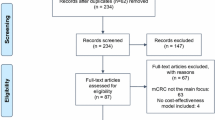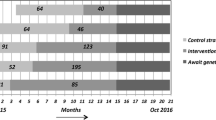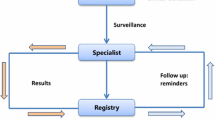Abstract
Colorectal cancer (CRC) is the most common cancer in Singapore. We sought to evaluate the long-term cost-effectiveness of targeted genetic testing and surveillance programs in individuals at high risk of hereditary non-polyposis colorectal cancer (HNPCC), as compared to an unselective clinical surveillance program alone in Singapore. A Markov model analysis from the healthcare service provider’s perspective was developed to follow over a lifetime a cohort of cancer-free 21-year-old individuals, who were first-degree relatives of HNPCC patients with a known mutation. Genetic testing strategy provided a lifetime saving of Singapore dollars (SGD) 13,588 per person and gained additional life years of 0.01, as compared to clinical surveillance alone, by sparing non-mutation carriers from unnecessary and invasive intensive clinical surveillance (assuming 100% compliance with recommended surveillance programs in both strategies). Sensitivity analyses showed that as long as the compliance rate in mutation carriers was not lower than that for individuals without genetic testing, pursuing a genetic testing strategy would either be a more favorable option with discounted incremental cost-effectiveness ratios ranging from SGD 6,961 to 17,289 per life year gained or a dominant status achieved (more life year gained and less costly). Genetic testing for individuals at high risk of HNPCC allows targeted clinical surveillance to be directed at mutation carriers, ensuring efficient use of healthcare resources and reduces CRC-related mortality. It can be regarded as a cost-effective strategy in Singapore, if an improved compliance with recommended surveillance protocol is achieved in proven mutation carriers.



Similar content being viewed by others
References
National Registry of Diseases Office of Singapore (2011) Singapore cancer registry interim annual registry report: trends in cancer incidence in Singapore 2005–2009 Health Promotion Board Singapore. http://www.nrdo.gov.sg/uploadedFiles/NRDO/Cancer_Trends_Report%20_05-09.pdf. Accessed 1 August 2011
Aaltonen LA, Salovaara R, Kristo P et al (1998) Incidence of hereditary nonpolyposis colorectal cancer and the feasibility of molecular screening for the disease. N Engl J Med 338(21):1481–1487
Lamberti C, Mangold E, Pagenstecher C et al (2006) Frequency of hereditary non-polyposis colorectal cancer among unselected patients with colorectal cancer in Germany. Digestion 74(1):58–67
Lynch HT, de la Chapelle A (2003) Hereditary colorectal cancer. N Engl J Med 348(10):919–932
Marra G, Boland CR (1995) Hereditary nonpolyposis colorectal cancer: the syndrome, the genes, and historical perspectives. J Natl Cancer Inst 87(15):1114–1125
Watson P, Lynch HT (1993) Extracolonic cancer in hereditary nonpolyposis colorectal cancer. Cancer 71(3):677–685
Watson P, Riley B (2005) The tumor spectrum in the Lynch syndrome. Fam Cancer 4(3):245–248
Aarnio M, Sankila R, Pukkala E et al (1999) Cancer risk in mutation carriers of DNA-mismatch-repair genes. Int J Cancer 81(2):214–218
Hampel H, Stephens JA, Pukkala E et al (2005) Cancer risk in hereditary nonpolyposis colorectal cancer syndrome: later age of onset. Gastroenterology 129(2):415–421
Lynch HT, Smyrk TC, Watson P et al (1993) Genetics, natural history, tumor spectrum, and pathology of hereditary nonpolyposis colorectal cancer: an updated review. Gastroenterology 104(5):1535–1549
Koh PK, Chew MH, Tan YS et al. (2010) Preliminary results of mismatch repair deficiency screening via immunohistochemical staining in young Asian colorectal cancers. In: Ling KL (ed) Proceedings of Singapore healthcare, vol 19, (1). pp 3–11
Ministry of Health Singapore (2010) MOH Clinical Practice Guidelines on cancer screening. http://www.moh.gov.sg/content/dam/moh_web/Publications/Guidelines/Clinical%20practice%20guidelines/2010/cpg_Cancer%20Screening%20Booklet%20FINAL%20v6.pdf. Accessed 1 Aug 2011
Stanley AJ, Gaff CL, Aittomaki AK et al (2000) Value of predictive genetic testing in management of hereditary non-polyposis colorectal cancer (HNPCC). Med J Aust 172(7):313–316
Loader S, Shields C, Rowley PT (2005) Impact of genetic counseling and DNA testing on individuals with colorectal cancer with a positive family history: a population-based study. Genet Test 9(4):313–319
Lynch HT, Watson P, Shaw TG et al (1999) Clinical impact of molecular genetic diagnosis, genetic counseling, and management of hereditary cancer. Part II: hereditary nonpolyposis colorectal carcinoma as a model. Cancer 86(11 Suppl):2457–2463
Dinh TA, Rosner BI, Atwood JC et al. (2011) Health benefits and cost-effectiveness of primary genetic screening for lynch syndrome in the general population. Cancer Prev Res (Phila) 4(1):9–22
Kievit W, de Bruin JH, Adang EM et al (2005) Cost effectiveness of a new strategy to identify HNPCC patients. Gut 54(1):97–102
Ramsey SD, Burke W, Clarke L (2003) An economic viewpoint on alternative strategies for identifying persons with hereditary nonpolyposis colorectal cancer. Genet Med 5(5):353–363
Ramsey SD, Clarke L, Etzioni R et al (2001) Cost-effectiveness of microsatellite instability screening as a method for detecting hereditary nonpolyposis colorectal cancer. Ann Intern Med 135(8 Pt 1):577–588
Reyes CM, Allen BA, Terdiman JP, Wilson LS (2002) Comparison of selection strategies for genetic testing of patients with hereditary nonpolyposis colorectal carcinoma: effectiveness and cost-effectiveness. Cancer 95(9):1848–1856
Syngal S, Weeks JC, Schrag D, Garber JE, Kuntz KM (1998) Benefits of colonoscopic surveillance and prophylactic colectomy in patients with hereditary nonpolyposis colorectal cancer mutations. Ann Intern Med 129(10):787–796
Vasen HF, van Ballegooijen M, Buskens E et al (1998) A cost-effectiveness analysis of colorectal screening of hereditary nonpolyposis colorectal carcinoma gene carriers. Cancer 82(9):1632–1637
Olsen KR, Bojesen SE, Gerdes AM, Lindorff-Larsen K, Bernstein IT (2007) Cost-effectiveness of surveillance programs for families at high and moderate risk of hereditary non-polyposis colorectal cancer. Int J Technol Assess Health Care 23(1):89–95
Breheny N, Geelhoed E, Goldblatt J, Ee H, O’Leary P (2006) Economic evaluation of the familial cancer programme in Western Australia: predictive genetic testing for familial adenomatous polyposis and hereditary non-polyposis colorectal carcinoma. Commun Genet 9(2):98–106
Jenkins MA, Baglietto L, Dowty JG et al (2006) Cancer risks for mismatch repair gene mutation carriers: a population-based early onset case-family study. Clin Gastroenterol Hepatol 4(4):489–498
Altekruse SF, Kosary CL, Krapcho M et al. (2010) SEER cancer statistics review 1975–2007 National Cancer Institute. http://seer.cancer.gov/csr/1975_2007/. Accessed 1 August 2011
Jarvinen HJ, Mecklin JP, Sistonen P (1995) Screening reduces colorectal cancer rate in families with hereditary nonpolyposis colorectal cancer. Gastroenterology 108(5):1405–1411
Wagner J, Tunis S, Brown M, Ching A, Almeida R (1996) Cost-effectiveness of colorectal cancer screening in average-risk adults. In: Young G, Rozen P, Levin B (eds) Prevention and early detection of colorectal cancer. Saunders, London, pp 321–356
Winawer SJ, Zauber AG, Ho MN et al (1993) Prevention of colorectal cancer by colonoscopic polypectomy. The National Polyp Study Workgroup. N Engl J Med 329(27):1977–1981
Winawer SJ, Zauber AG, O’Brien MJ et al (1993) Randomized comparison of surveillance intervals after colonoscopic removal of newly diagnosed adenomatous polyps. The National Polyp Study Workgroup. N Engl J Med 328(13):901–906
Vasen HF, Mecklin JP, Watson P et al (1993) Surveillance in hereditary nonpolyposis colorectal cancer: an international cooperative study of 165 families. The International Collaborative Group on HNPCC. Dis Colon Rectum 36(1):1–4
Wong SS, Leong AP, Leong TY (2004) Cost-effectiveness analysis of colorectal cancer screening strategies in Singapore: a dynamic decision analytic approach. Stud Health Technol Inform 107(Pt 1):104–110
Department of Statistics Singapore (2011) Key annual indicators. http://www.singstat.gov.sg/stats/keyind.html. Accessed 1 August 2011
Drummond MF, Sculpher MJ, Torrance GW, O’Brien BJ, Stoddart GL (2005) Methods for the economic evaluation of health care programmes. Oxford medical publications, 3rd edn. Oxford University Press, Oxford
Making choices in health: WHO guide to cost-effectiveness analysis (2003). World Health Organization, Geneva
Vasen HF, Moslein G, Alonso A et al (2007) Guidelines for the clinical management of Lynch syndrome (hereditary non-polyposis cancer). J Med Genet 44(6):353–362
Jarvinen HJ, Aarnio M, Mustonen H et al (2000) Controlled 15-year trial on screening for colorectal cancer in families with hereditary nonpolyposis colorectal cancer. Gastroenterology 118(5):829–834
Renkonen-Sinisalo L, Aarnio M, Mecklin JP, Jarvinen HJ (2000) Surveillance improves survival of colorectal cancer in patients with hereditary nonpolyposis colorectal cancer. Cancer Detect Prev 24(2):137–142
Bourne TH, Whitehead MI, Campbell S et al (1991) Ultrasound screening for familial ovarian cancer. Gynecol Oncol 43(2):92–97
Korhonen MO, Symons JP, Hyde BM, Rowan JP, Wilborn WH (1997) Histologic classification and pathologic findings for endometrial biopsy specimens obtained from 2964 perimenopausal and postmenopausal women undergoing screening for continuous hormones as replacement therapy (CHART 2 Study). Am J Obstet Gynecol 176(2):377–380
Langer RD, Pierce JJ, O’Hanlan KA et al (1997) Transvaginal ultrasonography compared with endometrial biopsy for the detection of endometrial disease. Postmenopausal Estrogen/Progestin Interventions Trial. N Engl J Med 337(25):1792–1798
Lanspa SJ, Lynch HT, Smyrk TC et al (1990) Colorectal adenomas in the Lynch syndromes. Results of a colonoscopy screening program. Gastroenterology 98(5 Pt 1):1117–1122
Mecklin JP, Jarvinen HJ (1986) Clinical features of colorectal carcinoma in cancer family syndrome. Dis Colon Rectum 29(3):160–164
Mecklin JP, Sipponen P, Jarvinen HJ (1986) Histopathology of colorectal carcinomas and adenomas in cancer family syndrome. Dis Colon Rectum 29(12):849–853
Ministry of Health Singapore (2007) National health surveillance survey 2007. http://www.moh.gov.sg/mohcorp/uploadedFiles/Publications/Reports/2009/nhss2007.pdf. Accessed 1 August 2011
Van Bebber SL, Liang S-Y, Phillips KA et al (2007) Valuing personalized medicine: willingness to pay for genetic testing for colorectal cancer risk. Pers Med 4(3):341–350
Esplen MJ, Madlensky L, Butler K et al (2001) Motivations and psychosocial impact of genetic testing for HNPCC. Am J Med Genet 103(1):9–15
Kolata G (1998) Genetic testing falls short of public embrace. The New York times, 27 March 1998, p A16
Lerman C, Hughes C, Trock BJ et al (1999) Genetic testing in families with hereditary nonpolyposis colon cancer. JAMA 281(17):1618–1622
Davey A, Rostant K, Harrop K, Goldblatt J, O’Leary P (2005) Evaluating genetic counseling: client expectations, psychological adjustment and satisfaction with service. J Genet Couns 14(3):197–206
Winawer SJ, Fletcher RH, Miller L et al (1997) Colorectal cancer screening: clinical guidelines and rationale. Gastroenterology 112(2):594–642
Sonnenberg A, Delco F, Inadomi JM (2000) Cost-effectiveness of colonoscopy in screening for colorectal cancer. Ann Intern Med 133(8):573–584
Acknowledgments
The authors would like to thank Dr Choo Su Pin from National Cancer Centre, Singapore, for her valuable advice on the non-surgical management of patients with advanced colon cancer.
Conflict of interest
None of the authors has conflict of interest.
Author information
Authors and Affiliations
Corresponding author
Rights and permissions
About this article
Cite this article
Wang, V.W., Koh, P.K., Chow, W.L. et al. Predictive genetic testing of first degree relatives of mutation carriers is a cost-effective strategy in preventing hereditary non-polyposis colorectal cancer in Singapore. Familial Cancer 11, 279–289 (2012). https://doi.org/10.1007/s10689-012-9513-y
Published:
Issue Date:
DOI: https://doi.org/10.1007/s10689-012-9513-y




